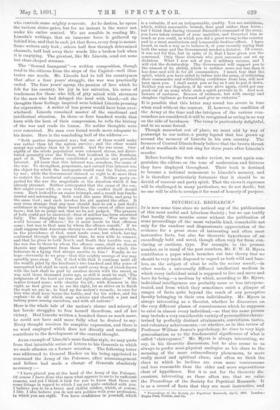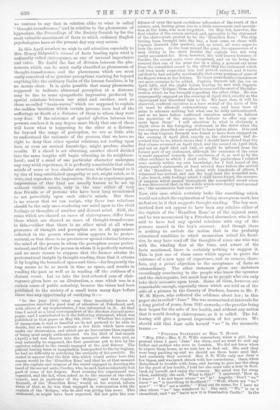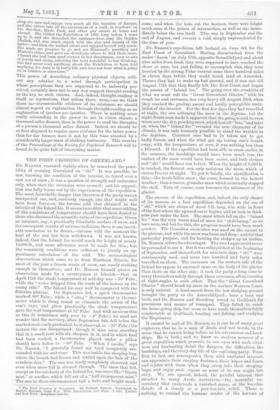PSYCHICAL RESEARCH.*
IT is now some time since we noticed any of the publicationa of this most useful and laborious Society ; but we can testify that hardly three months occur without the publication of some proceedings of the most valuable kind, remarkable not only for the candour and dispassionate appreciation of the evidence for a great store of interesting and often most instructive facts, but also for theoretic hypotheses of an exceedingly bold and novel, though often very far from con- vincing or cautious, type, For example, in the present number, as in many of the past numbers, Mr. F. W. H. Myers contributes a paper which launches out into theory that we should be very much disposed to regard as both wild and base- less, on the subject of what he calls the anima other words, a universally diffused intellectual medium in which every individual mind is supposed to live and move and have its being,—a medium by which, according to Mr. Myers, individual intelligences are probably more or less interpene- trated, and from which they sometimes catch a glimpse of ranges of facts quite beyond the reach of any perceptive faculty belonging to their own individuality. Mr. Myers ia always interesting as a theorist, whether he discourses on the very different planes of consciousness which he supposes to exist in almost every individual,—so that the same person may include a very considerable variety of personalities charac- terised by perfectly distinct attainments, convictions, tastes, and voluntary achievements,—or whether, as in this review of Professor William James's psychology, he rises to very high generalisation as to the fundamental significance of what is called "clairvoyance." Mr. Myers is always interesting, we say, in his theoretic discussions, but he also seems to us- always to prefer semi-physical analogies as his clues to the meaning of the more extraordinary phenomena, to more really moral and spiritual clues; and often we think the clues to which he inclines are even more venturesome and less reasonable than the older and more superstitious class of hypotheses. But it is not for the theoretic dis- cussions, interesting as these often are, that we value the Proceedings of the Society for Psychical Research. It is as a record of facts that they are most instructive, and Proceedings of ihe Society for Psychical Research, April, 1891. London Eagan Paul, Trench, and Co.
we venture to say that in relation alike to what is called "thought-transference," and in relation to the phenomena of hypnotism, the Proceedings of the Society furnish by far the most valuable assortment of facts to which ordinary English psychologists have at the present day any easy access.
In this April number, we wish to call attention especially to Mrs. Henry Sidgwick's re'swino of facts bearing upon what is ordinarily called clairvoyance, as one of unusual importance and value. No doubt the line of division between the phe- nomena which can be most easily classified as phenomena of thought-transference, and the phenomena which are most easily conceived of as genuine perceptions reaching far beyond anything like the ordinary limits of the human faculties, is by no means clear. It is quite possible that many phenomena supposed to indicate abnormal perception at a distance may be duo to some sympathetic impression produced by special relations between one mind and another, such as those so-called "brain-waves," which are supposed to explain
the sudden intuition which certain persons have had of the sufferings or death at a distance of those to whom they were very dear. If the existence of special affection between two persons renders it in any degree more likely that one of them will know what is happening to the other at a distance far beyond the range of perception, we are so little able to understand the rationale of the process, that we have no right to deny that other special relations, not resting upon love, or even on mutual knowledge, might produce similar results. If a chord is set vibrating, another chord divided into the same lengths will begin vibrating in its neighbour- hood; and if a mind of one particular character undergoes
any very vivid experience, it is perfectly conceivable that other minds of more or less similar structure, whether bound to it by ties of long-established sympathy or not, might catch, as it were, and reproduce the impression. So far as experience goes, impressions of this kind are usually known to be set up without visible causes, only in the case either of very dear friends, or of persons who have been long accustomed to act powerfully upon each other's minds. But there is no reason that we can assign, why these two relations should be the only ones rendering one mind open to the vivid feelings or thoughts of another and distant mind. Still, the cases which are classed as cases of clairvoyance, differ from those which are classed as eases of thought-transference in this,—either that there is no other mind at all whose processes of thought and perception are in all appearance reflected in the person whose vision appears to be preter- natural, or that there is no previous or special relation between the mind of the person in whom the perception seems preter- natural, and that of the person in whom it is perfectly natural, and no more reason to suppose that the former attains its preternatural insight by thought-reading, than that it attains it by leaping the bounds of space and time,—for frequently the leap seems to be as much in time as space, and results in reading the past as well as in reading off the outlines of a distant event. Let us take the best-attested case of clair- voyance given here as an illustration, a case which was in a eertain sense of public notoriety, because the vision had been published to the society of a small town many days before there was any opportunity of verifying it :-
' In the year 1850, what was then familiarly known as mesmerism received a good deal of attention at Peterhead, and, with others of my acquaintance, I was interested in it. At that time I acted as a local correspondent of the Aberdeen Journal news- paper, and I contributed to it the following statement, which was published in that paper on May 8th, 1850 Whether the science of mesmerism is real or fanciful we do not pretend to be able to decide, but we venture to narrate a few facts which have come under our observation, and which are no less curious than capable -of being most amply authenticated. On the 23rd of last month (April) a lad was thrown into the mesmeric state here, and, as may naturally be supposed, the first questions put to him by the .operator related to the vessels engaged at the seal fishery. The patient having been in imagination transported to the icy regions, he had no difficulty in satisfying the curiosity of his querists. He stated in answer that the first ship which would arrive here this season would be the Hamilton Ross,' and that he at that moment saw the captain and surgeon of the vessel engaged in dressing the hand of the second mate, Cardno, who, he said, had accidentally lost part of some of his fingers. Next evening the experiment waa repeated, and the lad, when asked as to the success of the other vessels, and in particular of the said that Captain Burnett, of the • Hamilton Ross,' would, on his arrival, inform them of that, as he was then engaged in conversation with the captain of the Eclipse, who he said was giving him news. This statement, as might have been exppoted, did not gain the con- fidenoe of even the most credulous advocates of the truth of the science, and, having given rise to a little amusement and specula- tion at the time, was soon forgotten. On May 3rd, however, the first whaler of the season arrived, and, agreeably to tho statement of the clairvoyant, proved to be the Hamilton Ross.' The ship having been brought into the bay, a boat came on shore with Captain Burnett (the master), and, as usual, all were eager to hear the news. As the boat neared the quay, the appearance of a man sitting in the stern besides the captain was not very easily accounted for. Soon, however, the well-known features of Cardno, the second mate, were recognised, and on its being dis- covered that one of his arms was in a sling a general cry arose from the assembled crowd to the effect that the statement which had been made respecting him had proved correct, and it turns out that he had actually accidentally shot away portions of some of his fingers when at the fishing. To those remarkable coincidences one more remains to be added. Captain Burnett left the ice on April 24th, and the night before leaving he met with Captain Gray, of the Eclipse,' from whom he received the most of the infor- mation which he has brought regarding the other ships. He was consequently engaged on the evening of April 23rd, exactly as the clairvoyant had described him to be. We have thus, it will be observed, confined ourselves to a baro recital of the facts of this (it must be allowed) extraordinary case, and have been at pains to advance nothing but what can be fully authenticated, and as we have before confessed ourselves unable to fathom the mysteries of the science, we forbear to offer any com- ment upon them.' I call attention to what is obviously a slight error in the foregoing statement, in the dates when the two seances described are reported to have taken place. It is said by me that Captain Burnett was found to have been engaged on the evening of April 23rd, exactly as the clairvoyant had de- scribed him to be, which shows that I should have stated that the first seance occurred on April 22nd, and the second on April 23rd, and not on April 23rd and 24th, as might be inferred from the former part of my statement, although the existence of the error is made apparent towards the conclusion of it, as wb11 as by the other evidence to which I shall refer. The particulars I related were mainly within my own knowledge, for I had heard of the clairvoyant's statements at least several days before.the arrival of the 'Hamilton Ross,' and, along with hundreds of others, I witnessed her arrival, and saw the boat land the wounded man. I also heard, with feelings which I shiarnever forget, the murmur of surprise which passed throughout the assembled crowd when it was discovered that, in the words which were freely used around me, the mesmerism bad come true!"
Now, this case, which certainly looks like something which would not admit the explanation of being mere guess-work, has no feature in it that suggests thought-reading. The boy mes- merised does not appear to have been any relative either of
the captain of the Hamilton Ross,' or of the injured mate, and he was mesmerised by a Peterhead shoemaker, who is not said to have had any special relations with any of the persons named in the boy's account. And though there is nothing to exclude the notion that in the probably stimulated condition to which mesmerism raised his facul- ties, he may have read off the thoughts of some one who was with the whaling fleet at the time, and aware of the facts mentioned, there is certainly nothing to suggest it. This is just one of those cases which appear to prove the existence of a new type of experience, and to remove, there- fore, any a priori objection. to the acceptance of facts so extraordinary. The other instances given are instances exceedingly convincing to the people who know the operator and the clairvoyante, but much less so to people who can only take their accounts upon trust. Some of them, however, are remarkable enough, especially those which are told us of the wife of a pitman in the County of Durham, known to Mr. F. W. H. Myers, who collected the evidence about her ; in this paper she is called "Jane." She was mesmerised at intervals for a long period of years, from 1845 onwards,—the practice being first begun for the sake of her health, and without any notion that it would develop clairvoyance, as it is called. The fol- lowing will give a general impression of her powers. We
should add that Jane calls herself "we" in the mesmeric trance :—
"FUETHER. STATEMENT Br Mae. T. Mynas.
"May, 1884.—Mrs. S. D. Wills remembers, when a girl, being present when- I gave 'Jane' the sleep, and we went to seek my father and mother who were in London. We did not know when to expect them home, so we sent her to find out. She said they were busy packing up and we should see them home next day. And certainly they arrived. Mrs. S. D. Wills only saw Jane a few times, and was much struck with her correctness. Once, when disinclined to trouble with Jane, and having to give her the sleep for the good of her health, I told her she must take a tour in Scot- land, by herself, and enjoy the scenery. My mind was far away when, suddenly, she said, What is this P AI n agra ry eDd 0, n'yt 'How 'Don't I know ? I do not know where "we" is.'
know " we " is travelling in Scotland 'Well, where are "we"
now P " Wo " see a castle.' 'Find out its name, for I have no idea where " wo " has wandered to.' She said, " We" is on a steamboat, and "we" know now it is Dumbarton Castle In the sleep she sees and enjoys very much all the beauties of Nature, and also enters into all the amusement of a walk, in Scarboro' on the See-Saw, Hyde Park, and other gay scenes at home and abroad. She visited the Exhibition of 1862, long before I went up to it, and she described the entrance-door, near the Golden Obelisk, and was much struck with the size and beauty of the latter; and then she walked about and enjoyed herself very much. She made me promise to go and see Emanuel's jewellery and Minton's china, and gave me directions where to find their cases. I found she had been most correct in her description, even to sets of jewels and china, selecting the most beautiful to her thinking. She had never read anything about the Exhibition or been told anything, for Jane is in lowly life, and does not hear what is going on in London or elsewhere."
This power of describing ordinary physical objects, with- out any relation to a mind through participation in whose perceptions they are supposed to be indirectly per- ceived, certainly does not in any way suggest thought-reading as the key to such visions. And, indeed, thought-reading is itself so mysterious, that unless there were,—as we think there is,—incontestable evidence of its existence, we should almost regard an explanation through thought-reading as an explanation of ignotum per ignotius. There is nothing more really astounding in the power to see in vision objects a thousand miles distant, than in the power to read the thoughts of a person a thousand miles distant. Indeed, we should be at first disposed to require more evidence for the latter power than for the former, were it not by this time attested by a considerably larger mass of striking testimony. This number of the Proceedings of the Society for Psychical Research will be found to be quite full of interesting matter.








































 Previous page
Previous page